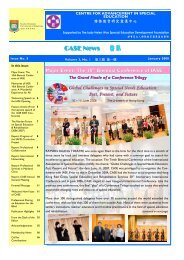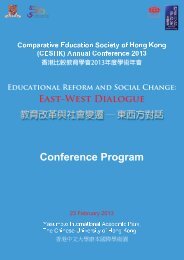C E R C u l a r - Faculty of Education - The University of Hong Kong
C E R C u l a r - Faculty of Education - The University of Hong Kong
C E R C u l a r - Faculty of Education - The University of Hong Kong
You also want an ePaper? Increase the reach of your titles
YUMPU automatically turns print PDFs into web optimized ePapers that Google loves.
CERCular<br />
Vol.10, No.2, 2004<br />
07/11/96 Max Eckstein <strong>The</strong> History <strong>of</strong> Comparativ e<br />
<strong>Education</strong>: Reflections <strong>of</strong> a Methodologist<br />
28/11/96 Anthony Welch Strategies for International-<br />
ising Higher <strong>Education</strong> - An Institutional Re<br />
sponse<br />
10th Anniversary: Highlights from CERC’s first decade<br />
3 September 2003 11 December 2003<br />
<strong>Education</strong> Systems and <strong>Education</strong>al<br />
Spaces in a Shift <strong>of</strong> Paradigm<br />
Wolfgang Mitter<br />
Director, German Institute for International<br />
<strong>Education</strong>al Research<br />
If by “education system” we understand institutional units,<br />
provided with “educational sovereignty” consisting <strong>of</strong> common<br />
legal provisions, organisational structures, curricular goals and<br />
value foundations as its constitutive components, the current<br />
period signals their decline. This shift <strong>of</strong> paradigm is included<br />
in the decline <strong>of</strong> the modern nation state, as the latter has<br />
characterised the political map <strong>of</strong> Europe for three hundred<br />
years and gradually expanded to the other continents. <strong>The</strong>refore<br />
education systems in their “state-bound” constitution must be<br />
identified as a category <strong>of</strong> “organised space” within a given<br />
historical period – and not as a perpetual phenomenon.<br />
<strong>The</strong> understanding <strong>of</strong> the current “education systems”<br />
points the way to the concept <strong>of</strong> “educational spaces” in periods<br />
preceding the modern nation state and helping to identify the<br />
current stages <strong>of</strong> transition, indicated by the emergence <strong>of</strong><br />
regional “educational spaces” in their different structures and<br />
ranges according to historical and territorial dimensions.<br />
Furthermore, the expansion <strong>of</strong> private sectors and, finally, the<br />
invasion <strong>of</strong> the globalising markets into the “knowledge society”<br />
come into the picture when this shift <strong>of</strong> paradigm is discussed.<br />
18/06/97 David Post <strong>The</strong> Social Consequences <strong>of</strong> Colo-<br />
nial <strong>Education</strong> in <strong>Hong</strong> <strong>Kong</strong><br />
02/01/98 Philip Altbach World Trends in the Interna-<br />
tionalization <strong>of</strong> higher <strong>Education</strong><br />
05/10/98 Wolfgang Mitter New Perspectiv es <strong>of</strong> Com-<br />
parative <strong>Education</strong> in the Light <strong>of</strong> the Tension<br />
between Globalisation and Cultural Pluralism<br />
03/11/98 Patricial Potts Human Rights and Inclusiv e<br />
<strong>Education</strong> in China: A western Perspective on<br />
Comparative Understanding<br />
10/12/98 Gu Mingyuan Reflections on my life in Compa-<br />
rative <strong>Education</strong><br />
14/12/98 Ference Marton Conceptions <strong>of</strong> Formal and<br />
Informal Learning held by First Year Aboriginal<br />
and Torres Strait Islander <strong>University</strong> Students<br />
25/01/99 Patricia Broadfoot Stones from Other Hills<br />
May Serve to Polish the Jade <strong>of</strong> This one: Learn-<br />
ing from Comparing<br />
08/02/99 Ivor Goodson Crisis <strong>of</strong> <strong>Education</strong>al Change<br />
01/11/99 Nina Borevskaya <strong>Education</strong>al Legacies and<br />
Modern Reforms: A Comparison <strong>of</strong> Experiences<br />
in China and Russia<br />
15<br />
Is the World Keeping Its<br />
Promises? Monitoring progress<br />
towards the UN Millennium<br />
Development Goals in education<br />
in the Asia-Pacific Region<br />
Victor Ordonez<br />
Senior <strong>Education</strong> Fellow, East-West Center<br />
During the historic Millennium Summit <strong>of</strong> 2000, the governments<br />
<strong>of</strong> the world, many represented by their heads<br />
<strong>of</strong> state, expressed their resolve to shape a better world for<br />
the coming century. <strong>The</strong>y committed themselves to a landmark<br />
document resolving to reduce poverty, illiteracy,<br />
disease, environmental degration, and the like. What was<br />
remarkable about the document were the specific and timebound<br />
targets that were set to achieve these goals.<br />
This presentation reviews these goals and the<br />
progress made towards them, particularly the education<br />
goals, and particularly in the Asia and Pacific region. It draws<br />
upon data and reports that have attempted to measure this<br />
progress, and draws out <strong>of</strong> the data a few lessons that can<br />
be learned from experience in various country settings as<br />
they made good progress in some cases, and poor progress<br />
in others.<br />
24/01/00 Neville Postlethwaite <strong>The</strong> History, Evolution and<br />
Impacts <strong>of</strong> the IEA<br />
17/04/00 Peter Fensham Didaktik vs Curriculum: Aspects<br />
<strong>of</strong> Two Traditions in <strong>Education</strong> and their Impli-<br />
cations for Teacher <strong>Education</strong> and Curriculum<br />
05/12/00 Michael Crossley Continuity, Challenges and<br />
Change in Comparativ e and International<br />
<strong>Education</strong><br />
01/11/01 Angela Little Development Studies and Compa-<br />
rative <strong>Education</strong>: Context, Content, Compari-<br />
son and Contributions<br />
12/11/01 Robert Arnove Comparative <strong>Education</strong>: <strong>The</strong><br />
Dialectic <strong>of</strong> the Global and the Local<br />
10/12/01 Rosemary Preston Global Influences on Re-<br />
search in International & Comparative Educa-<br />
tion<br />
18/02/02 Carole Hahn Comparative Perspectives on Civ-<br />
ic <strong>Education</strong><br />
29/04/02 Robert LeVine <strong>The</strong> Anthropology <strong>of</strong> Educa-<br />
tional Processes<br />
24/10/02 Carol Coombe Managing the Impact <strong>of</strong> HIV/<br />
AIDS on the Provision <strong>of</strong> <strong>Education</strong>: Lessons from<br />
South Afirca and China<br />
02/04/02 Johan Muller What knowledge is most needed<br />
for the twenty-first contury?<br />
04/02/04 Joseph Zajda Globalisation, Policy and Compa-<br />
rative <strong>Education</strong>: Changing Paradigms

















